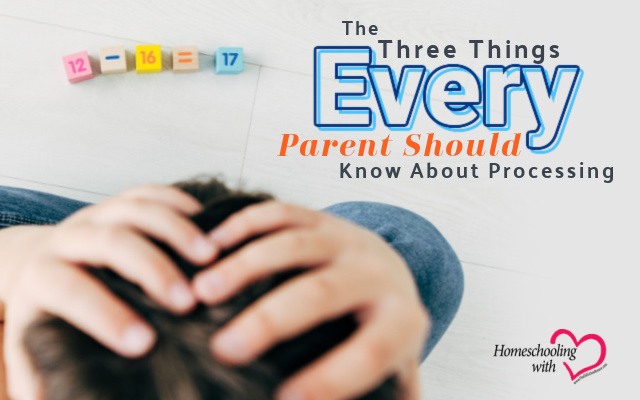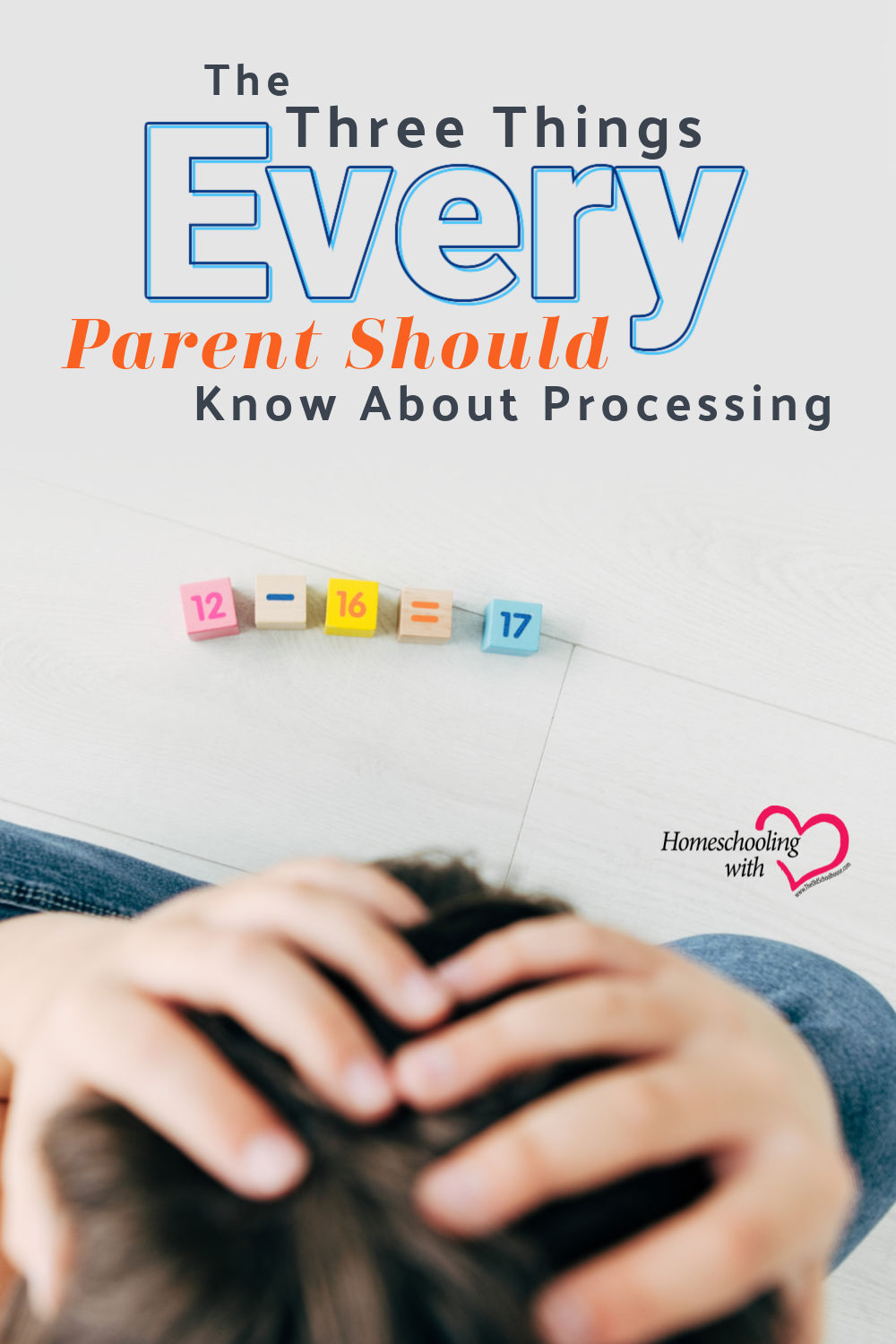The Three Things Every Parent Should Know About Processing


I want to set the record straight: you are NOT the cause of your child’s learning failures, inability to pay attention, or frequently inappropriate behaviors. Blame does not lie (100%) on your curriculum choices, daily schedule, or child-raising philosophy.
Rather the culprit is something involuntary and unintentional. No amount of scolding, yelling, crying, or changing curricula will alter the outcome until you recognize the underlying cause(s) behind your child’s frustrations—and yours—with learning and life.
The cause is the way your child’s brain takes information in, then what it does (or doesn’t do) with it. In the mechanics of his learning process, things go awry. Somehow the information you teach doesn’t come out the way you expect it to. It manifests in many ways. Early on, “bed” becomes “deb” and 2 + 3 never equals 5; later, your teen doesn’t get the nuances of literature. How can that happen, especially when your child is so smart in so many areas and you’ve worked so hard to do it right?
Well, it can be like baking a cake. You follow the directions, expecting a delectable, sweet outcome. To your surprise, when you open the oven door, you’re greeted with a flat and tasteless mess. What happened? Who knows? It could be a faulty oven, a bad recipe, or any number of things unbeknownst to you.
The same thing happens with learning. However, a likely suspect is a processing problem. This problem occurs when your child’s brain doesn’t receive or misinterprets the information necessary to understand and master an academic subject or to behave appropriately in a social situation. The signals get crossed somewhere between the teaching and the learning. The brain doesn’t do what you and your frustrated child expect it to do. Sometimes, I’ve seen students with a myriad of processing problems close their eyes, hit their head, and groan when their brain won’t cooperate with them.
Myriad is the operative word when dealing with processing issues. Your child can labor under several types simultaneously. For you and your child to navigate through these often treacherous processing shoals, every parent must recognize and understand the three basic types of processing roadblocks to learning: accuracy, speed, and integration.
- ACCURACY
Here’s a short list of what it looks like when children don’t accurately interpret information you’re trying to teach them. Conversely, inaccurate processing also disrupts their ability to show what they do know.
- ndsifrbl splng (indecipherable spelling)
- illegible handwriting
- constantly asks “Huh?” or “What?” and you automatically repeat what you said
- makes careless mistakes in math
- fails to follow directions, especially ones with more than two steps
- misspeaks, like “blank” for “bank”
- reads the first few letters of a word then guesses at the rest, incorrectly
- reverses letters in reading and writing and numbers in math
- reverses letters within words like “saw” for “was”
- omits words in reading
- misreads small, one-syllable words yet reads larger ones
- often gives inappropriate answers to simple questions like:
Q: “Where’s your cap?”
A: “Napping on my bed.”
- frequent meltdowns, broken pencils, ripped worksheets, and slammed doors
- spaces out (This one is more complex than accuracy processing.)
These telltale signs can indicate your child’s brain isn’t synthesizing information accurately.
Some sort of glitch exists between what’s presented and the way your child’s brain absorbs it. The brain can experience around 12 discrete causes that occur in all sensory fields (visual, auditory, motor, etc.) to explain the brain’s inability to accurately perceive and process data from the world around it.
The most common are omissions and substitutions. For example, many individuals, not just children, literally don’t hear vowel sounds. For that person, when a word like “cap” is heard “k_p,” it could just as easily be understood as “cup” or “cop” and spelled “cp” or “kp.” Likewise, consonant sounds are misinterpreted. The individual’s brain cannot discriminate between the sound of d and t, or b and p, and freely substitutes one for the other. Often the glitch in interpretation of sound and written symbols is physiological. The good news is it can be manageable, if not correctable, with speech, vision, cognitive, or educational therapies.
The question becomes then, how do I know where my child’s inaccurate processing originates and how do I fix it? That’s a great question. First, a brief discussion about processing speed and integration because the answer applies to those factors as well.
- SPEED
Processing speed is the rate at which the brain responds to a stimulus, whether it’s incoming or outgoing. Whizzing processing speed can cause problems, but slow processing speed derails many children and adults with average- and above-average intelligence. You can recognize slow processing by
- Delayed verbal and/or motor responses to questions and instructions
- Aversion and refusal to engage in written tasks
- Assignments and chores take much longer than expected
- Shuts down or loses attention easily and quickly
- Fidgets
- Uncomfortable in new situations and avoids them
- Explodes unexpectedly, especially with frustration
Suppressed processing speed occurs when the brain’s mechanisms slow due to external or internal brain trauma (a blow to the head, brain bleed), medical conditions (birth defect, epilepsy, cancer), emotional trauma (unexpected death of relative or friend or negative personal experience), or no reason at all. Though time-intensive to correct, slow processing speed responds to education-based brain enrichment resources, like Critical Thinking Press, and computer-based brain training programs. However, the most effective tool for parents dealing with a child with slow processing speed is the gift of patience.
- INTEGRATION
Integration is the brain’s ability for all parts to work together as God designed it to do. However, different parts may not communicate well and stymy achievement. Often, integration handicaps highly gifted people as twice exceptional (2E): exceptional in intelligence and in their inability to access it.
Integration problems manifest as
- heavy reliance on one mode of learning (ie. auditory/verbal or visual/motor)
- avoiding writing tasks
- left/right confusion
- getting lost easily
- unexpected inability to master seemingly simple learning tasks.
Like accuracy and speed, integration’s remedy requires parent/educator patience and understanding root causes.
KNOWLEDGE IS POWER
You now know accuracy, speed, and integration are the three key aspects of processing difficulties and their symptoms. How do you know if processing difficulties are the cause of your child’s learning problems, and what to do about it? You can self-teach by scouring websites, reading books, and attending training to make judgement calls about what is best for your child based on your research. A shorter, more accurate way is through reliable psycho-educational assessments.
Administered by a reputable, licensed psychologist, psycho-educational assessments reveal not only the child’s academic achievement but also whether processing difficulties pose the biggest threat to long-term achievement. If not, could it be memory, attention, learning potential, cognitive ability, or a combination? A skilled educational psychologist can answer those questions and craft an individualized action plan.
A full assessment battery requires commitment and investment of time and assets, but it’s well worth it. I credit the invaluable information I gleaned from my children’s assessments for their ultimate success as adults. Without it, I was lost. The framework it created gave me hope and faith to persevere when my children struggled.
You can, too.
Dr. Brenda Murphy
 Educational psychologist Dr. Brenda Murphy lives out her mission to Serve All in Love by sharing her deep knowledge of the art and science of teaching through professional development, personal consultation, and mentorship. She encourages all teachers, parents, and students to experience new possibilities through her belief that they each possess undiscovered gifts and talents. Find out more about Dr. Brenda and how she helps parents like you at www.sailawaylearning.com.
Educational psychologist Dr. Brenda Murphy lives out her mission to Serve All in Love by sharing her deep knowledge of the art and science of teaching through professional development, personal consultation, and mentorship. She encourages all teachers, parents, and students to experience new possibilities through her belief that they each possess undiscovered gifts and talents. Find out more about Dr. Brenda and how she helps parents like you at www.sailawaylearning.com.

















































